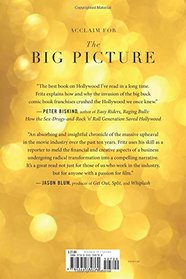I obtained a copy from the library on the strength of an essay that reviews it in the context of the industry from Irving Thalberg onward in The New Yorker. 28 May 2018, pp. 71-75, 'Clobbering Time,' by Stephen Metcalf.
The point is that today what is vital is IP--Intellectual Property--and the money will be made by those who have the rights to proprietary universes such as Marvel. The public used to know certain actors for their repeated roles in various productions and the names were still of some importance when Mr. Ovitz provided packages of talent for productions. But today the aficionados seem to want to enter these universes and not be overly concerned with who wearing the costume. Reading the review of Ron Howard's latest production, 'Solo,' in the LA Weekly this afternoon (I forgot to bring a book to read on the bus), it seems to me that Mr. Fritz is right. It is a respectable film, a workman like production, a pleasant outing, etc. However, it didn't measure up to expectations at the box office--maybe they had been to that well too often.
Regarding the best picture Academy Award nomination of Amazon's 'Manchester by the Sea' (January 2017), Ben Fritz notes: "But in a few years, it may be remembered best as the moment when Amazon proved it could do what Hollywood would no longer could: provide a sustainable, supportive home for interesting, original indie movies." "But Amazon didn't make movies primarily to make money from movies. It used movies to draw attention, to increase engagement, and to dominate people's time and digital behavior so they would ultimately buy more stuff from the company."
It is a must to read the excellent Introduction. The author has a strong background in print media and says this book's examination of the inside stories is made possible by the publication of the Sony memos. "Today, anything that's not a big-budget franchise film or a low-cost, ultra-low-risk comedy or horror movie is an endangered species at Hollywood's six major studios." "Of the top fifty movies at the global box office between 2012 and 2016, forty-three were sequels, spinoffs, or adaptations of popular comic books and young-adult novels (five of the remaining seven were family animation, the sole genre in which originality still consistently works)."
"What happened? Audiences' loyalties shifted. Not to other stars, but to franchises. Today, no person has the box-office track record that Cruise once did, and it's hard to imagine that anyone will again. But Marvel Studios does. Harry Potter does. Fast & Furious does. Moviegoers looking for the consistent, predictable satisfaction they used to get from their favorite stars now turn to cinematic universes."
Megan Ellison's financing of movies is well discussed, that being an anomaly.
The latter half of the book is about how the initiative (and profits) is now held by television, by Netflix, by Amazon....
Index, endnotes. No photos.
The point is that today what is vital is IP--Intellectual Property--and the money will be made by those who have the rights to proprietary universes such as Marvel. The public used to know certain actors for their repeated roles in various productions and the names were still of some importance when Mr. Ovitz provided packages of talent for productions. But today the aficionados seem to want to enter these universes and not be overly concerned with who wearing the costume. Reading the review of Ron Howard's latest production, 'Solo,' in the LA Weekly this afternoon (I forgot to bring a book to read on the bus), it seems to me that Mr. Fritz is right. It is a respectable film, a workman like production, a pleasant outing, etc. However, it didn't measure up to expectations at the box office--maybe they had been to that well too often.
Regarding the best picture Academy Award nomination of Amazon's 'Manchester by the Sea' (January 2017), Ben Fritz notes: "But in a few years, it may be remembered best as the moment when Amazon proved it could do what Hollywood would no longer could: provide a sustainable, supportive home for interesting, original indie movies." "But Amazon didn't make movies primarily to make money from movies. It used movies to draw attention, to increase engagement, and to dominate people's time and digital behavior so they would ultimately buy more stuff from the company."
It is a must to read the excellent Introduction. The author has a strong background in print media and says this book's examination of the inside stories is made possible by the publication of the Sony memos. "Today, anything that's not a big-budget franchise film or a low-cost, ultra-low-risk comedy or horror movie is an endangered species at Hollywood's six major studios." "Of the top fifty movies at the global box office between 2012 and 2016, forty-three were sequels, spinoffs, or adaptations of popular comic books and young-adult novels (five of the remaining seven were family animation, the sole genre in which originality still consistently works)."
"What happened? Audiences' loyalties shifted. Not to other stars, but to franchises. Today, no person has the box-office track record that Cruise once did, and it's hard to imagine that anyone will again. But Marvel Studios does. Harry Potter does. Fast & Furious does. Moviegoers looking for the consistent, predictable satisfaction they used to get from their favorite stars now turn to cinematic universes."
Megan Ellison's financing of movies is well discussed, that being an anomaly.
The latter half of the book is about how the initiative (and profits) is now held by television, by Netflix, by Amazon....
Index, endnotes. No photos.




